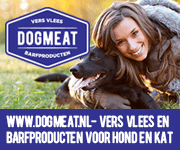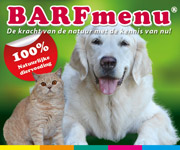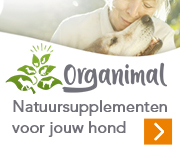tschabo schreef:Her en der lees ik dat het niet goed is om verse vleesvoeding te mengen met brokken omdat deze verhit zijn geweest en de maag van de hond een andere pH waarde nodig heeft om dit te kunnen verteren. Het wordt dus afgeraden omdat je dan geen optimale vertering kunt krijgen.
Maar hoe zit dat dan met KVV producenten die wat rijst door hun KVV mengen? Daar geldt toch eigenlijk hetzelfde principe voor? Iemand enig idee?
Je zou het artikel er even bij moeten zoeken maar volgens de nieuwere inzichten van Mary Strauss is dit onzin en stijgt de pH waarde van het maagzuur sowieso, maakt niet uit wat je in de maag gooit.
Hier, de tekst van Mary:
I do still advocate adding fresh food to commercial diets. Most dogs do fine with this combination. If you have a dog that does not seem to do well when adding fresh food to dry or canned commercial food, then it makes sense to separate them, but otherwise I do not feel it is necessary.
The one exception is raw meaty bones. Feeding bones in the same meal with kibble may interfere with the digestion of the bones. Even in this case many dogs do fine when the two are combined, but I feel it's better to separate them to avoid the potential risk of partially digested bones passing thru the digestive tract.
Geen vleesbot voeren tegelijkertijd met brok!
There are almost 4000 members on the K9Nutrition list, and a large number of them add fresh foods to kibble. I have yet to hear of anyone experiencing problems from doing this.
I understand the logic behind those who warn about the potential for bacterial problems when fresh food that may be contaminated with bacteria is combined with kibble, but I have never been able to track down any information to support these theories. It must be remembered that dogs and wolves evolved with the ability to handle heavy loads of bacteria, primarily due to their very short and simple digestive tracts. Dogs eat feces, lick their own butts, eat carrion, and in general have access to many source of bacteria other than from raw food. Yet this bacteria does not cause problems even for kibble-fed dogs.
Many dog treats have also been found to be infected with salmonella, yet to the best of my knowledge, there is no evidence that this has led to any problems in dogs, whether fed kibble or raw.
I can't find anything in a quick scan of the article written by Mogens Eliasen to support the idea that there is any reason not to feed fresh foods with kibble, so I'm not sure what you're referring to there.
I have tried to track down the often-cited claim that kibble takes longer to digest without success. As far as I know, no such studies have ever been done and these claims are simply hearsay.
The chart at the bottom of page 2 in the article you cite from Mountain Dog Food shows changes in pH level in acid to which dry and raw food is added. It is interesting, but is not proof of what happens in a dog's stomach and does not relate to digestion time, so again, I'm not sure what you're referring to.
The claim from the Mountain Dog Food people that they have investigated dogs with bacterial infections and found that they were fed a mixture of raw and either commercial food or treats is interesting, but unsubstantiated. There are so many problems that are labeled "bacterial infection" that are never confirmed. If you look at the veterinary web sites and conference proceedings that talk about diagnosing bacterial infections, you will see that such a diagnosis is very difficult, and that the finding of bacteria alone does not mean that it is the cause of the symptoms, as many normal, healthy dogs will also have similar bacteria in their digestive tracts. See the following for example:
http://www.vetmed.ucdavis.edu/CCAH/Upda ... tinal.html
"Veterinarians are faced with a quandary when attempting to diagnose dogs and cats with suspected bacterial-associated diarrhea, because these organisms commonly represent a normal part of the host's intestinal microflora."
<
http://www.vin.com/VINDBPub/SearchPB/Pr ... R00126.htm >
"The clinical documentation of enteropathogenic bacteria causing diarrhea in dogs and cats is clouded by the presence of these organisms occurring as a normal component of the indigenous intestinal flora."
I have seen all kinds of warnings about the bacteria in raw food, from those telling people not to ever feed raw food to dogs, to those saying that it's dangerous to mix raw with kibble, to feed raw to a dog on chemotherapy, to an immune-compromised dog, etc. As far as I can tell, none of these warnings are based on facts. I have no problem whatsoever with people doing what they're most comfortable doing, and anyone who chooses not to mix raw food with kibble is welcome to do so, but to say that it is dangerous is simply conjecture that is unsupported by any data that I'm aware of.
Personally, I would rather people add fresh food to kibble. There is so much to be gained by feeding a variety of fresh, healthy foods that I would hate for people to be afraid to do so out of fear of bacterial infection that dogs are very unlikely to ever have problems with. Again, unless those who feed kibble are making sure that their dogs have no access to other sources of bacteria, including licking their own butts, then they are not really protecting their dog from bacterial infection by refusing to feed fresh foods, they are simply denying their dogs the benefits of the fresh foods.
With all that said, each dog is an individual. If you have a dog that does not seem to do well when fresh foods are mixed with kibble, then it makes sense to feed them separately.
You are welcome to post this information to your list if you want, but don't expect it to change the minds of those who are convinced otherwise, any more than the thousands of us who successfully feed our dogs a raw diet can convince those who believe we are killing our dogs by doing so.
Mary Straus
~~~~~~~~~~~~
It's fine to add ground bones to kibble, just not whole bones.
You don't need to worry about the digestion of ground bone being interfered with by kibble, since it's already in tiny bits. I just worry a bit about larger bone chunks making it into the intestines if the kibble interferes with their digestion (whole bones and kibble compete for digestive juices, as the stomach churns to put the 'bigger bits' next to the stomach wall to digest and break them down).
Mary
~~~~~~~~~~~~~~~~~~~~~
Met andere woorden: je kunt brok met vlees mengen, je kunt vlees met rijst mengen: het heeft allemaal nauwelijks invloed op de pH waarde van het maagzuur. Combineer alleen geen hele vleesbotten met brok vanwege het feit dat bot wel een heel andere vertering vraagt.








